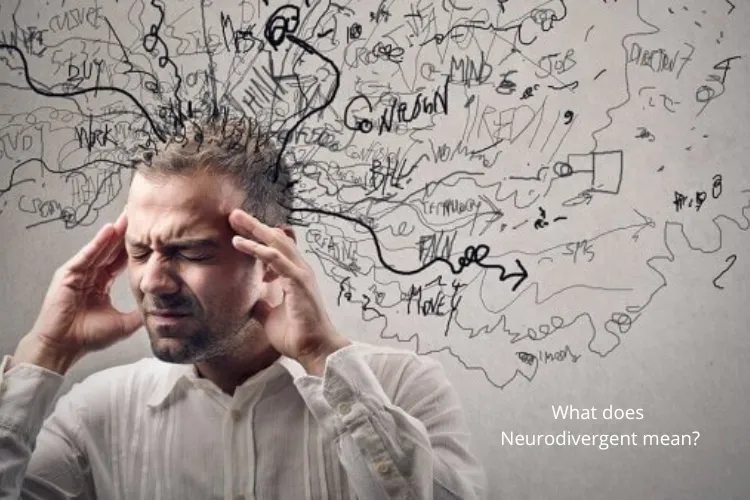Neurodivergent: Meaning, Signs, Mental Health, Good or Bad?

“Neurodiversity is:
• A state of nature to be respected
• An analytical tool for examining social issues
• An argument for the conservation and facilitation of human diversity
It is NOT a synonym for “Neurological Disorder”
– Judy Singer 2020
Is “Neurodiveregent” a new term? Have you ever considered that your brain and the brain of another person may not think in the same way? Is this something that is inherited, or does it develop as a result of trauma? What impact has being a Neurodivergent had on your daily life? A few concerns should be addressed when discussing Neurodivergence. But first, consider how it all began. Judy Singer, an autistic sociologist, coined the term “neurodiversity” in 1997. Neurodiversity is divided into two types of people: Neurotypical and Neurodivergent and here will be looking at the Neurodivergent aspect of it.
What does it mean when a person is Neurodivergent?
Neurodivergent is a nonmedical term that describes individuals whose brains develop or function differently for unknown reasons. A Neurodivergent child is one who is “differently abled.” Adults and children develop differently as a result of neurodiversity, and each has its own set of abilities and challenges. No two brains, not even those of identical twins are exactly the same, just like fingerprints. As a result, there is no definition of “normal” human brain capabilities. The term “Neurodivergent” has no medical significance. It distinguishes between “normal” and “abnormal” people. This is significant because there is no universal definition of “normal” brain functioning.
What are the Signs of Neurodivergence?
Neurodivergence is frequently recognized as the result of a diagnosis, but it appears to exist prior to a prognosis and also can exist with or without a diagnosis. Neurodiversity can be caused by a physical or emotional injury or trauma, but it is most commonly present at birth. Many people are born with atypical brains, and research into the genetic and environmental causes of disorders like autism and ADHD is ongoing. Thoughts, behaviors, and emotional responses can all be Neurodivergent, and it is important to remember that neurodivergence is a cultural construct. As a result, “standard” behaviors in one part of the world may be considered “atypical” in another part of the world or at a different time in history.
Do you criticize yourself just because you are different from others? Let our Wellness Experts at Ganeshaspeaks.com help you accept your differences.
Talk to Online Therapist
View AllIn which forms Neurodivergence may occur?
Neurodivergence comes in many forms. People with the following may consider themselves Neurodivergent:
• People with ADHD frequently have a lot of energy, which can lead to hyperactivity and difficulty sitting still at school or work. As a result, staying focused or organized can be challenging. However, these characteristics can also indicate that people with ADHD are spontaneous and dynamic.
• People with Learning Disabilities have difficulties learning and absorbing information. Dyslexia, for example, affects reading ability, whereas dysgraphia affects handwriting and fine motor skills. Individuals with these diagnoses are not stupid or incapable of learning; in fact, they frequently have average or above-average intelligence. However, they can benefit from learning in a variety of ways.
• Autism affects how people process sensory information, think, and communicate. An autistic person, for example, may be overly sensitive to certain sounds and noises or have difficulty reading social cues. Others may have narrow, in-depth interests. The effects vary greatly between individuals.
• Tourette’s syndrome is a neurological condition that causes involuntary movements or sounds, known as tics.
• Individuals with synesthesia have a variety of sensory experiences. When they hear music, they may see colors or shapes, and when they hear words, they may taste certain flavors. They may only have this experience in their “mind’s eye” or in the world around them.
• Some people believe that neurodivergence encompasses unusual forms of giftedness. People suffering from hyperthymesia – a condition in which one can remember abnormal amount of experiences in detail. They have an abnormally accurate memory of their own life experiences.
Is mental health included in Neurodivergence?
The diagnoses are not related to mental health; rather, they are neurodevelopmental in nature. They have characteristics that remain constant over time. Some people, however, believe that mental health conditions are a component of neurodivergence because they can alter how people think and behave. People with these conditions may face similar challenges, such as feeling misunderstood or stigmatized. However, mental health conditions have some characteristics that make them distinct:
• Being Neurodivergent does not always imply a lower quality of life. People who identify as such can live successful lives in right circumstances. A supportive environment, on the other hand, does not prevent mental health conditions from affecting the quality of life.
• Many people’s identities are shaped by their neurodiversity. Some people may have similar feelings about their mental health. This point of view may be detrimental in certain cases. Viewing anorexia as a lifestyle or identity.
• Finally, many mental health issues are treatable and can be significantly improved with proper care and treatment. Autism, learning disabilities, and other types of neurodivergence are not interchangeable. Though there is no cure for these diagnoses, appropriate support can help people learn the skills they struggle with.
Never struggle with mental health. Seek therapy immediately.
How Do You Accommodate a Neurodivergent Person?
Neurodivergent individuals can vary greatly from one another, making it difficult to provide a unified list of accommodations. There are, however, some accommodations that can benefit both children and adults, regardless of whether they have a specific Neurodivergent diagnosis. Some of the easiest and most effective accommodations are:
• Neurodiversity awareness and willingness to be flexible at school or work when specific, reasonable requests are made: These can range from using noise-canceling headphones in school corridors to preferring to work from home or communicate via text message rather than videoconference.
• Sensitivity to social differences: Examples include smiling instead of frowning when someone speaks loudly, has tics, stammers, or finds it difficult to socialize normally, as well as repeating words or speaking more slowly to improve comprehension.
• Creating a job that capitalizes on an individual’s strengths while not overtaxing weaknesses.
• Involving neurodiverse students and employees in the design of office environments, teams, and project management systems.
“Recognizing and respecting differences in others, and treating everyone like you want them to treat you, will help make our world a better place for everyone.”
-Kim peek










